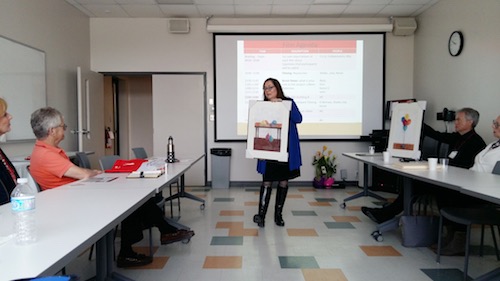Publications.
O’Keefe-McCarthy, S., Mussie, I., Taplay, K. Michaelson, H., Faleiro, R. (2023). The Emotional Burden of Living with Ischemic Heart Disease: An Artistic Approach. British Journal of Cardiac Nursing, 18(9), 1-12. https://doi.org/10.12968/bjca.2022.0134
Presentations:
O’Keefe-McCarthy, S. Mussie, I., Taplay, K. The Emotional Burden of Cardiovascular Disease-Represented through Poetry and Lyrics. Kingston Virtual Nursing Conference, Queen’s University, Kingston, Ontario, March 3, 2022 [Primary Investigator] [Oral/Poster].
O’Keefe-McCarthy, S. [Invited Plenary] Embodying your Research through Arts-based Approaches: Mobilizing Knowledge in Impactful Ways. Mapping New Knowledges Graduate Conference, Brock University, April 12th 2023. https://www.youtube.com/watch?v=pXoz6-2cxsM (Ascendancy)
https://www.youtube.com/watch?v=YfPxqgxQ9Ac(The DIS-ease of my Disease)
O’Keefe-McCarthy, S., Taplay, K., [Invited Plenary and Art Exhibit]. Arts-based Research: Creating Tools for Meaningful Knowledge Translation. St. Bartholomew’s Hospital, London, England, March 23, 2023.
O’Keefe-McCarthy, S., Taplay, K., Keeping-Burke, L., Flynn-Bowman. A., McCleary, L., Abernethy, J., Prentice, M., Tyrer, K., Salfi, J. Recognizing Pain as an Early Warning Sign of Ischemic Heart Disease: A Qualitative Artistic Representation of the Journey. St. Bartholomew’s Hospital, 900th Anniversary, London, England. March 23, 2023.
O’Keefe-McCarthy, S., Taplay, K., Keeping-Burke, L., Flynn-Bowman, A., Vanessa Sjaarda, V., Moretti, R., Dinnarr, C., Romas, S., Bernier, B., Muraca, V., Anwar, Y. Tensions of Time: Journeying towards Recognition of Heart Disease: Captured by Thematic Photography. St Bartholomew’s Hospital, 900th Anniversary, London, England. March 23, 2023.
O’Keefe-McCarthy, S., Taplay, K., Mussie, I., Michaelson, H. Faleiro, R. The Emotional Burden Living with Ischemic Heart Disease: An Artistic Understanding. St Bartholomew’s Hospital, 900th Anniversary, London, England. March 23, 2023.
O’Keefe-McCarthy, S., Norris, J., Hobbs, K., Metz M.M., Ganesh, N., Moreno, R. He-art-istic Journeys III: Heart DIS-ease PlaY- [The Moment-]. St Bartholomew’s Hospital, 900th Anniversary, London, England. March 23, 2023.
O’Keefe-McCarthy, S. [Invited Plenary] Opening up the heart through ART. The Society of Cardiovascular Thoracic Surgery, The Royal College of Surgeons of Edinburgh, University Day/Conference, Birmingham, England. March 19-21st, 2023.
O’Keefe-McCarthy, S., Taplay, K., Mussie, I., Michaelson, H. Faleiro, R. The Emotional Burden Living with Ischemic Heart Disease: An Artistic Understanding. The Society of Cardiothoracic Surgery Annual Conference, Birmingham, United Kingdom, March 21, 2023.
O’Keefe-McCarthy, S. [Invited Plenary and art exhibit]. Translating Research Data into Art. The Society of Cardiovascular Thoracic Surgery, The Royal College of Surgeons of Edinburgh, University Day/Conference, Birmingham, England. March 19-21st, 2023.
O’Keefe-McCarthy, S., Taplay, K., Keeping-Burke, L., Flynn-Bowman. A., McCleary, L., Abernethy, J., Prentice, M., Tyrer, K., Salfi, J . Recognizing Pain as an Early Warning Sign of Ischemic Heart Disease: A Qualitative Artistic Representation of the Journey. Society of Cardiothoracic Surgery- University Day, Annual Conference, Birmingham, England, March 19, 2023.
O’Keefe-McCarthy, S., Taplay, K., Keeping-Burke, L., Flynn-Bowman, A., Vanessa Sjaarda, V., Moretti, R., Dinnarr, C., Romas, S., Bernier, B., Muraca, V., Anwar, Y. Tensions of Time: Journeying towards Recognition of Heart Disease: Captured by Thematic Photography. SCTS University Day, Birmingham, United Kingdom, March 19th, 2023.
O’Keefe-McCarthy, S., Taplay, K., Mussie, I., Michaelson, H. Faleiro, R. The Emotional Burden Living with Ischemic Heart Disease: An Artistic Understanding. SCTS University Day, Birmingham, United Kingdom, March 19th 2023.
O’Keefe-McCarthy, S. [Invited presentation] Introduction to Qualitative Methods. The Society of Cardiovascular Thoracic Surgery, The Royal College of Surgeons Of Edinburgh. Virtual Core Research Skills Educational Course. November 19, 2022.







![Symptom Story- Hand Clutching Aching Heart- Digital Art] Artist Frankie Warner- Group of Six: Six Nations](https://sokeefemccarthy.ca/wordpress/wp-content/uploads/2024/09/Symptom-Story.jpg)










